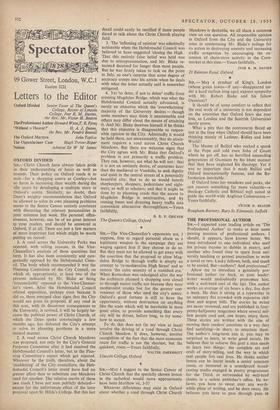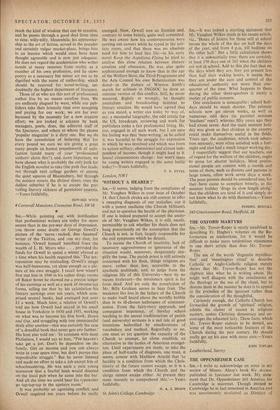THE PROFESSIONAL AUTHOR
SIR,—I expected your leading article on 'The Professional Author' to make at least some passing mention of professional authors. I should, it appears, have known better. We were introduced to one individual who used his private income to dabble in poetry, and another who found time to spare from uni- versity teaching or genteel journalism to write a novel or two. Lucky fellows, both, and much to be envied. But—authors? And professional?
Allow me to introduce a genuinely pro- fessional author (or hack, as your leader- writer would undoubtedly pronounce him, with a well-bred curl of the lip). This author works an average of six hours a day, five days a week. He does it sitting at a typewriter in an unluxury flat crowded with expensive chil- dren and urgent bills. The stories he writes are never reviewed, and are published in four- penny-halfpenny magazines where several mil- lion people read and, one hopes, enjoy them. These stories are written with the aim of moving their readers' emotions in a way they find satisfying—in short, to entertain them. The author's long-term aim is, you may be surprised to learn, to write good novels. He believes that to achieve this goal a man needs to learn two things: the complete art and craft of story-telling, and the way in which real people live real lives. He thinks neither lesson can be learnt inside a senior common room, or immured in a soundproof broad- casting studio engaged in poetry programmes for the Third, or surrounded by well-bred chums in a sedate publisher's office. He be- lieves you have to sweat over any worth- while piece of writing, and he does sweat. He believes you have to pass through pain to
reach the kind of wisdom that can be creative, and he passes through a good deal from time to time, willy-nilly. Meanwhile, his apprentice- ship to the art of fiction, served in the popular and certainly vulgar market-place, brings him in an income which would once have been thought agreeable and is now just adequate. He does not regard the academician who writes novels at many removes from reality as a member of his own profession, and he views poetry as a necessary but minor art not to be dignified with the name of authorship, which should be reserved for novel-writing, un- doubtedly the highest department of literature.
Those of us who are this sort of professional author live by no means carefree lives. We are endlessly plagued by want, while our pub- lishers take their leisurely time over accepting and paying for our work; we are for ever harassed by the necessity for a new creative effort; we are looked at askance by bank managers, poets, dons, the editorial staff of the Spectator, and others to whom the phrase `popular magazine' is a dirty one. But we do have the consolation of believing that for every pound we earn we are giving a great many people an honest poundsworth of satis- faction (could many of your 'professional authors' claim this?), and, more important, we have chosen what is probably the only path for the English novelist to.take (the path that leads, not through neat college gardens or among the quiet squares of Bloomsbury, but through the noisiest streets, the dirtiest slums, even the dullest suburbs) if he is to escape the pre- vailing literary sickness of pernicious anmmia. —Yours faithfully,
HOWARD WYCE
4 Cornwall Mansions, Cremorne Road, SWIG



































 Previous page
Previous page